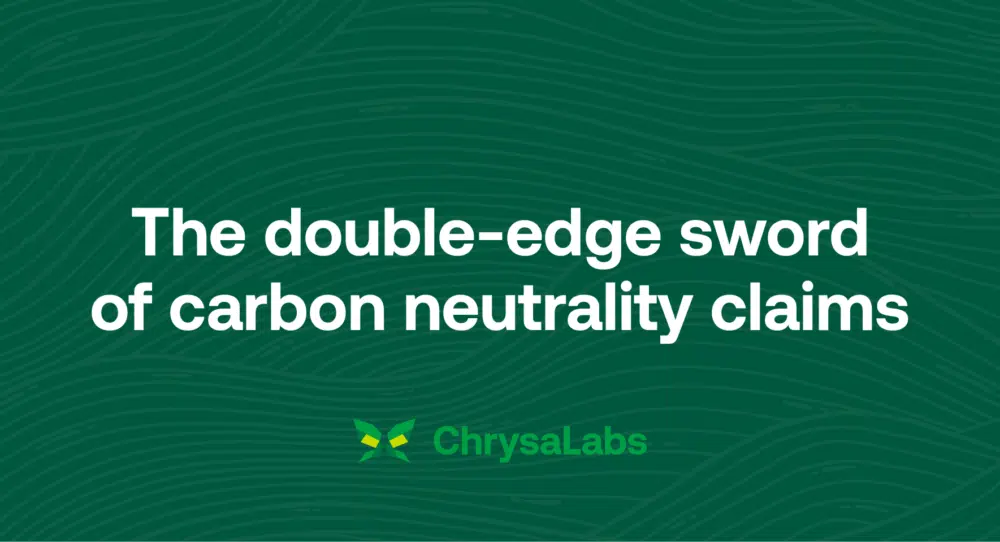Greenwashing is an unfortunate reality that threatens the integrity of the market as companies race to reduce their carbon footprints.
The voluntary carbon market (VCM) is both a ray of hope and, for various and couterintuitive reasons, an enigma in the world’s persistent pursuit of a sustainable future.
One member of the team recently made a remark that has stuck with the rest of the group: “The industry’s quest for credibility is constantly undermined by the prevalent greenwashing among some buyers.” There is an increasing need for true and reliable statements as companies strive for the coveted “net-zero” label. But how can we verify their validity?
Each of us is contributing to the same climate change goal. Let’s put in some teamwork.
Greenwashing and reputational risk
A wake-up call comes when a big giant like Apple gets news not for a technological wonder but for a mistake in its carbon-neutral promises. The assertions made by Apple left more questions than answers, as noted by The Verge. The stakes could not be higher than they are now, when every action a company does is scrutinised.
“The EU’s crackdown on dubious climate claims is a much-needed reality check,” says Dr Sofia Reinhardt, a top sustainability expert, citing Euractiv’s latest expose. The European Union’s strict standards have always put it ahead of the pack when it comes to environmental protection. This latest legislative action to limit misleading climate change statements is evidence of such dedication.
The EU’s regulation is more than simply a piece of legislation; it’s a warning to companies and organisations all across the globe. The rule requires firms to give transparent proof of their carbon offset programmes and prohibits them from making deceptive “climate-neutral” claims. Failure to comply can have severe financial and public relations consequences for a brand. To sum up, the EU is fighting for honesty and openness in business by making it such that firms can’t hide behind empty rhetoric. Greenwashing will be met with the hammer, as this regulatory heavyweight has made quite plain.
Credibility should take precedence over assertions.
VCMI’s Claims Code of Practise stands out as a possible game-changer among this instability. By providing a guide through the murky waters of carbon offsetting, our project attempts to help consumers more confidently claim carbon offset benefits. It’s usefulness as a resource for shoppers is only part of its relevance.
The Core Carbon Principles are designed for the industry or vendors and run in tandem with the Claims Code of Practise. The former aids purchasers in assessing the veracity of sellers’ claims, while the latter keeps the industry’s verification and validation requirements for carbon credits at a high level of rigour. They are like two legs of a stool, helping supporting the VCM together.
These principles are more than simply suggestions; they are the foundation for keeping the carbon market from devolving into a lawless wasteland of questionable claims and shady dealings. However, given that United’s CEO has labelled numerous carbon offset programmes as “fraudulent,” one has to ask if these standards are enough.
The difficulty for the sector is twofold: maintaining its own reputation while being exposed to some extent to the sincerity of the purchasers’ promises.
What’s the fix? A move towards more rigorous processes. Natural Based Solutions (NBS) and Direct Air Capture (DAC) are two technologies that might soon become the industry standard as businesses look for reliable solutions to offset their emissions, and it’s possible that we’re “building the plane as we’re flying it” with carbon removals.
carbon removals.
Toward an open and sustainable future
“The best marketing is predicated on empathy, not deceit.” was said at one time. Greenwashing is more than simply a marketing misstep in today’s era of the educated consumer and the truth that the VCM buyer is dependent on brand image and perception to some extent. The way forward for brands and the VCM is paved with genuineness, openness, and a dedication to making a difference. Only then can we make real progress towards a net-zero future.
Other sources:




